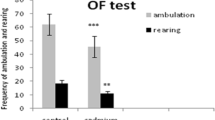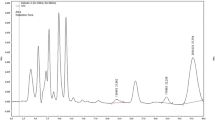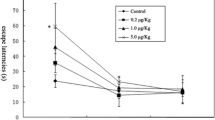Abstract
Heavy metal contamination in aquatic environments plays an important role in the exposure of humans to these toxicants. Among these pollutants, mercury (Hg) is one main concern due to its high neurotoxicity and environmental persistence. Even in low concentrations, Hg bioaccumulation is a major threat to human health, with higher impact on populations whose diet has fish as chief consumption. Mercury compounds have high affinity for neuronal receptors and proteins, which gives Hg its cumulative feature and have the ability to cross cell membranes and blood–brain barrier to show their neurotoxicity. Intoxication with Hg increases levels of reactive oxygen species (ROS), thus depleting faster the resource of antioxidant proteins. To evaluate Hg-induced hippocampal ROS production, synaptic plasticity, anxiety, and memory, a total of 11 male Wistar rats were exposed to HgCl2 (Hg30 group) to produce a residual concentration of 8 ng/mL at the end of 30 days. Behavioral tests (plus-maze discriminative avoidance task), in vitro electrophysiology, and ROS assays were performed. Western blot assay showed decreased levels of antioxidant proteins GPx and SOD in Hg30 group. Increased ROS production was observed in the CA1 and CA3 regions in the Hg-exposed group. Plus-maze task detected long-term memory impairment in Hg30 group, linked to poorer in vitro long-term potentiation as compared to control group. Hg intoxication also promoted higher anxiety-like behavior in the exposed animals. In conclusion, our data suggests that low doses of HgCl2 resulted in impaired long-term memory and unbalance between decreased antioxidant protein expression and increased ROS production in the hippocampus.







Similar content being viewed by others
References
Agarwal R, Behari JR (2007) Screening for mercury in aqueous environmental samples and urine samples using thin layer chromatography. Water Environ Res 79:2457–2463
Ahmad S, Mahmood R (2019) Mercury chloride toxicity in human erythrocytes: enhanced generation of ROS and RNS, hemoglobin oxidation, impaired antioxidant power, and inhibition of plasma membrane redox system. Environ Sci Pollut Res Int 26(6):5645–5657. https://doi.org/10.1007/s11356-018-04062-5
Allen JW, Shanker G, Tan KH, Aschner M (2002) The consequences of methylmercury exposure on interactive functions between astrocytes and neurons. Neurotoxicology 23:755–759. https://doi.org/10.1016/S0161-813X(01)00076-6
Aragão WAB, Teixeira FB, Fagundes NCF, Fernandes RM, Fernandes LMP, da Silva MCF, Amado LL, Sagica FES, Oliveira EHC, Crespo-Lopez ME, Maia CSF, Lima RR (2018) Hippocampal dysfunction provoked by mercury chloride exposure: evaluation of cognitive impairment, oxidative stress, tissue injury and nature of cell death. Oxidative Med Cell Longev 7878050. https://doi.org/10.1155/2018/7878050 eCollection 2018
Aschner M, Aschner JL (1990) Mercury neurotoxicity: mechanisms of blood-brain barrier transport. Neurosci Biobehav Rev 14(2):169–176 Review
Avramovic N, Dragutinovic V, Krstic D, Colovic M, Trbovic A, de Luka S, Milovanovic I, Popovic T (2012) The effects of omega 3 fatty acid supplementation on brain tissue oxidative status in aged wistar rats. Hippokratia 16(3):241–245
Bliss TV, Lomo T (1973) Long-lasting potentiation of synaptic transmission in the dentate area of the anaesthetized rabbit following stimulation of the perforant path. J Physiol 232:331–356
Bouayed J, Rammal H, Soulimani R (2009) Oxidative stress and anxiety: relationship and cellular pathways. Oxidative Med Cell Longev 2:63–67. https://doi.org/10.4161/oxim.2.2.7944
Branco V, Ramos P, Canário J et al (2012) Biomarkers of adverse response to mercury: histopathology versus thioredoxin reductase activity. J Biomed Biotechnol 2012:1–9. https://doi.org/10.1155/2012/359879
Casañas-Sánchez V, Pérez JA, Fabelo N, Quinto-Alemany D, Díaz ML (2015) Docosahexaenoic (DHA) modulates phospholipid-hydroperoxide glutathione peroxidase (Gpx4) gene expression to ensure self-protection from oxidative damage in hippocampal cells. Front Physiol 6:203. https://doi.org/10.3389/fphys.2015.00203 eCollection 2015
Chaari N, Chebel S, Merchaoui I, Kerkeni A, Neffati F, Najjar F, Akrout M (2015) Neuropsychological effects of mercury exposure among dentists in Monastir City. Recent Patents Inflamm Allergy Drug Discov 9(2):151–158
Costa JMFJ, AADS L, Rodrigues DJ, Khoury EDT, GDS S, Silveira LCL, MDCN P (2017) Emotional and motor symptoms in riverside dwellers exposed to mercury in the Amazon. Rev Bras Epidemiol 20(2):212–224. https://doi.org/10.1590/1980-5497201700020003
Dorea J, Barbosa AC, Ferrari I, de Souza JR (2003) Mercury in hair and in fish consumed by Riparian women of the Rio Negro, Amazon, Brazil. Int J Environ Health Res 13:239–248. https://doi.org/10.1080/0960312031000122398
Eagles-Smith CA, Wiener JG, Eckley CS, Willacker JJ, Evers DC, Marvin-DiPasquale M, Obrist D, Fleck JA, Aiken GR, Lepak JM, Jackson AK, Webster JP, Stewart AR, Davis JA, Alpers CN, Ackerman JT (2016) Mercury in western North America: a synthesis of environmental contamination, fluxes, bioaccumulation, and risk to fish and wildlife. Sci Total Environ 568:1213–1226. https://doi.org/10.1016/j.scitotenv.2016.05.094
Farina M, Campos F, Vendrell I, Berenguer J, Barzi M, Pons S, Suñol C (2009) Probucol increases glutathione peroxidase-1 activity and displays long-lasting protection against methylmercury toxicity in cerebellar granule cells. Toxicol Sci 112:416–426. https://doi.org/10.1093/toxsci/kfp219
Farina M, Avila DS, da Rocha JBT, Aschner M (2013) Metals, oxidative stress and neurodegeneration: a focus on iron, manganese and mercury. Neurochem Int 62:575–594. https://doi.org/10.1016/j.neuint.2012.12.006
Fu W, Lei YF, Chen JL, Xiong CM, Zhou DN, Wu GH, Chen J, Cai YL, Ruan JL (2010) Parathelypteriside attenuates cognition deficits in d-galactose treated mice by increasing antioxidant capacity and improving long-term potentiation. Neurobiol Learn Mem 94(3):414–421. https://doi.org/10.1016/j.nlm.2010.08.009
Furieri LB, Galán M, Avendaño MS, García-Redondo AB, Aguado A, Martínez S, Cachofeiro V, Bartolomé MV, Alonso MJ, Vassallo DV, Salaices M (2011) Endothelial dysfunction of rat coronary arteries after exposure to low concentrations of mercury is dependent on reactive oxygen species. Br J Pharmacol 162:1819–1831. https://doi.org/10.1111/j.1476-5381.2011.01203.x
Furling D, Ghribi O, Lahsaini A, Mirault ME, Massicotte G (2000) Impairment of synaptic transmission by transient hypoxia in hippocampal slices: improved recovery in glutathione peroxidase transgenic mice. Proc Natl Acad Sci U S A 97(8):4351–4356
Gassó S, Cristfol RM, Selema G et al (2001) Antioxidant compounds and Ca2+ pathway blockers differentially protect against methylmercury and mercuric chloride neurotoxicity. J Neurosci Res 66:135–145
Gouazé V, Andrieu-Abadie N, Cuvillier O et al (2002) Glutathione peroxidase-1 protects from CD95-induced apoptosis. J Biol Chem 277:42867–42874. https://doi.org/10.1074/jbc.M203067200
Guimarães Marques MJ, Reyes-Garcia SZ, Marques-Carneiro JE et al (2018) Long-term potentiation decay and poor long-lasting memory process in the wild rodents Proechimys from Brazil’s Amazon Rainforest. Front Behav Neurosci 12:1–8. https://doi.org/10.3389/fnbeh.2018.00002
Gupta M, Bansal JK, Khanna CM (1996) Blood mercury in workers exposed to the preparation of mercury cadmium telluride layers on cadmium telluride base. Ind Health 34:421–425
Gutiérrez J, Baraibar AM, Albiñana E, Velasco P, Solís JM, Hernández-Guijo JM (2018) Methylmercury reduces synaptic transmission and neuronal excitability in rat hippocampal slices. Pflugers Arch - Eur J Physiol 470:1221–1230. https://doi.org/10.1007/s00424-018-2144-x
Hogg S (1996) A review of the validity and variability of the elevated plus-maze as an animal model of anxiety. Pharmacol Biochem Behav 54:21–30. https://doi.org/10.1016/0091-3057(95)02126-4
Itoh J, Nabeshima T, Kameyama T (1990) Utility of an elevated plus-maze for the evaluation of memory in mice: effects of nootropics, scopolamine and electroconvulsive shock. Psychopharmacology 101:27–33
Jensen S, Jernelöv A (1969) Biological methylation of mercury in aquatic organisms. Nature 223:753–754
Kar P, Agnihotri SK, Sharma A, Sachan R, Lal Bhatt M, Sachdev M (2012) A protocol for stripping and reprobing of Western blots originally developed with colorimetric substrate TMB. Electrophoresis. 33(19-20):3062–3065. https://doi.org/10.1002/elps.201200333
Kar P, Agnihotri SK, Sharma A, Sachan R, Bhatt ML, Sachdev M (2015) A novel methodology for stripping and reprobing of western blots originally developed with colorimetric substrate TMB. Methods Mol Biol 1314:349–355. https://doi.org/10.1007/978-1-4939-2718-0_35
Kelly L, Grehan B, Chiesa AD, O’Mara SM, Downer E, Sahyoun G, Massey KA, Nicolaou A, Lynch MA (2011) The polyunsaturated fatty acids, EPA and DPA exert a protective effect in the hippocampus of the aged rat. Neurobiol Aging 32(12):2318.e1–2318.15. https://doi.org/10.1016/j.neurobiolaging.2010.04.001
Knapp LT, Klann E (2002) Role of reactive oxygen species in hippocampal long-term potentiation: contributory or inhibitory? J Neurosci Res 70:1–7. https://doi.org/10.1002/jnr.10371
IBAMA (2015) Laudo Técnico Preliminar Impactos ambientais decorrentes do desastre envolvendo o rompimento da barragem de Fundão, em Mariana, Minas Gerais. Avaible from http://www.ibama.gov.br/phocadownload/barragemdefundao/laudos/laudo_tecnico_preliminar_Ibama.pdf.
Leão AHFF, Medeiros AM, Apolinário GKS et al (2016) Hippocampal-dependent memory in the plus-maze discriminative avoidance task: the role of spatial cues and CA1 activity. Behav Brain Res 304:24–33. https://doi.org/10.1016/j.bbr.2016.02.012
Lohren H, Bornhorst J, Galla HJ, Schwerdtle T (2015) The blood-cerebrospinal fluid barrier--first evidence for an active transport of organic mercury compounds out of the brain. Metallomics. 7(10):1420–1430. https://doi.org/10.1039/c5mt00171d
Lohren H, Bornhorst J, Fitkau R, Pohl G, Galla HJ, Schwerdtle T (2016) Effects on and transfer across the blood-brain barrier in vitro-comparison of organic and inorganic mercury species. BMC Pharmacol Toxicol 17(1):63
Lynch M (2002) Dietary antioxidants and synaptic plasticity: cellular and molecular mechanisms. Diet - Brain Connect 47–61
Malqui H, Anarghou H, Ouardi FZ, Ouasmi N, Najimi M, Chigr F (2018) Continuous exposure to inorganic mercury affects neurobehavioral and physiological parameters in mice. J Mol Neurosci 66:291–305. https://doi.org/10.1007/s12031-018-1176-1
Margis R, Dunand C, Teixeira FK, Margis-Pinheiro M (2008) Glutathione peroxidase family-an evolutionary overview. https://doi.org/10.1111/j.1742-4658.2008.06542.x
Martin DS, Spencer P, Horrobin DF, Lynch MA (2002) Long-term potentiation in aged rats is restored when the age-related decrease in polyunsaturated fatty acid concentration is reversed. Prostaglandins Leukot Essent Fat Acids 67(2-3):121–130
Massaad CA, Klann E (2011) Reactive oxygen species in the regulation of synaptic plasticity and memory. Antioxid Redox Signal 14(10):2013–2054. https://doi.org/10.1089/ars.2010.3208 Review
Mattiasson G, Friberg H, Hansson M, Elmér E, Wieloch T (2003) Flow cytometric analysis of mitochondria from CA1 and CA3 regions of rat hippocampus reveals differences in permeability transition pore activation. J Neurochem 87(2):532–544
Mello-Carpes PB, Barros W, Borges S, Alves N, Rizzetti D, Peçanha FM, Vassallo DV, Wiggers GA, Izquierdo I (2013) Chronic exposure to low mercury chloride concentration induces object recognition and aversive memories deficits in rats. Int J Dev Neurosci 31:468–472. https://doi.org/10.1016/j.ijdevneu.2013.05.009
Nicoll RA (2017) A brief history of long-term potentiation. Neuron 93:281–290. https://doi.org/10.1016/j.neuron.2016.12.015
O’Malley GF (2017) The blood of my veins – mercury, Minamata and the soul of Japan. Clin Toxicol 55:934–938. https://doi.org/10.1080/15563650.2017.1326606
Patrick L (2006) Lead toxicity part II: the role of free radical damage and the use of antioxidants in the pathology and treatment of lead toxicity. Altern Med Rev 11:114–127
Reyes-Garcia SZ, de Almeida A-CG, Ortiz-Villatoro NN et al (2018) Robust network inhibition and decay of early-phase LTP in the hippocampal CA1 subfield of the Amazon rodent Proechimys. Front Neural Circ 12:81. https://doi.org/10.3389/fncir.2018.00081
Santana LN d S, Bittencourt LO, Nascimento PC et al (2019) Low doses of methylmercury exposure during adulthood in rats display oxidative stress, neurodegeneration in the motor cortex and lead to impairment of motor skills. J Trace Elem Med Biol 51:19–27. https://doi.org/10.1016/J.JTEMB.2018.09.004
Sharma AC, Kulkarni SK (1992) Evaluation of learning and memory mechanisms employing elevated plus-maze in rats and mice. Prog Neuro-Psychopharmacol Biol Psychiatry 16:117–125
Shenker BJ, Guo TL, Shapiro IM (1998) Low-level methylmercury exposure causes human T-cells to undergo apoptosis: evidence of mitochondrial dysfunction. Environ Res 77:149–159. https://doi.org/10.1006/enrs.1997.3816
Sies H (1991) Role of reactive oxygen species in biological processes. Klin Wochenschr 69:965–968
Silva RH, Frussa-Filho R (2000) The plus-maze discriminative avoidance task: a new model to study memory-anxiety interactions. Effects of chlordiazepoxide and caffeine. J Neurosci Methods 102:117–125
Sundseth K, Pacyna J, Pacyna E et al (2017) Global sources and pathways of mercury in the context of human health. Int J Environ Res Public Health 14:105. https://doi.org/10.3390/ijerph14010105
Syversen T, Kaur P (2012) The toxicology of mercury and its compounds. J Trace Elem Med Biol 26(4):215–226. https://doi.org/10.1016/j.jtemb.2012.02.004 Review
Teixeira F, Fernandes R, Farias-Junior P, Costa NM, Fernandes LM, Santana LN, Silva-Junior AF, Silva MC, Maia CS, Lima RR (2014) Evaluation of the effects of chronic intoxication with inorganic mercury on memory and motor control in rats. Int J Environ Res Public Health 11:9171–9185. https://doi.org/10.3390/ijerph110909171
Teixeira FB, de Oliveira ACA, Leão LKR et al (2018) Exposure to inorganic mercury causes oxidative stress, cell death, and functional deficits in the motor cortex. Front Mol Neurosci 11:1–11. https://doi.org/10.3389/fnmol.2018.00125
Ukai M, Miura M, Kameyama T (1995) Effects of galanin on passive avoidance response, elevated plus-maze learning, and spontaneous alternation performance in mice. Peptides 16:1283–1286
Vahabzadeh M, Balali-Mood M (2016) Occupational metallic mercury poisoning in gilders. Int J Occup Environ Med 7(2):116–122. https://doi.org/10.15171/ijoem.2016.776
Wiggers GA, Peçanha FM, Briones AM et al (2008) Low mercury concentrations cause oxidative stress and endothelial dysfunction in conductance and resistance arteries. Am J Physiol Circ Physiol 295:H1033–H1043. https://doi.org/10.1152/ajpheart.00430.2008
Yee S, Choi BH (1994) Methylmercury poisoning induces oxidative stress in the mouse brain. Exp Mol Pathol 60:188–196. https://doi.org/10.1006/exmp.1994.1017
Yin Z, Jiang H, Syversen T, Rocha JB, Farina M, Aschner M (2008) The methylmercury-L-cysteine conjugate is a substrate for the L-type large neutral amino acid transporter. J Neurochem 107(4):1083–1090. https://doi.org/10.1111/j.1471-4159.2008.05683.x
Yin B, Barrionuevo G, Batinic-Haberle I, Sandberg M, Weber SG (2017) Differences in reperfusion-induced mitochondrial oxidative stress and cell death between hippocampal CA1 and CA3 subfields are due to the mitochondrial thioredoxin system. Antioxid Redox Signal 27(9):534–549. https://doi.org/10.1089/ars.2016.6706
Zeitoun MM, Mehana E-SE (2014) Impact of water pollution with heavy metals on fish health: overview and updates. Glob Vet 12:219–231. https://doi.org/10.5829/idosi.gv.2014.12.02.82219
Zemolin APP, Meinerz DF, de Paula MT et al (2012) Evidences for a role of glutathione peroxidase 4 (GPx4) in methylmercury induced neurotoxicity in vivo. Toxicology 302:60–67. https://doi.org/10.1016/j.tox.2012.07.013
Author contributions statement
Authors’ contributions were as follows: D.V.V, F.A.S, A.C.F, and C.A.S designed the research; L.F.O and S.Z.R.G performed the electrophysiology experiments; L.F.O, L.D.R, and M.G.M conducted the behavior experiments; M.B.N, M.G.M, and K. Z performed biochemical experiments; L.F.O, L.D.R, M.G.M, M.B.N, and A.C.F analyzed the data; L.F.O, G.M.C, L.D.R, C.A.S, and F.A.S wrote the paper.
Funding
This work was supported by grants from Instituto Nacional de Neurociência Translacional (MCTIC/CNPq, Brazil) and CNPq (Brazil) to F.A.S. This study was financed in part by the Coordenaçāo de Aperfeiçoamento de Pessoal de Nível Superior–Brasil (CAPES–Finance Code 001) and by the State of Sao Paulo Research Support Foundation (FAPESP)
Author information
Authors and Affiliations
Corresponding author
Ethics declarations
Competing interests
The authors declare that they have no competing interests.
Additional information
Responsible editor: Philippe Garrigues
Publisher’s note
Springer Nature remains neutral with regard to jurisdictional claims in published maps and institutional affiliations.
Rights and permissions
About this article
Cite this article
Oliveira, L.F., Rodrigues, L.D., Cardillo, G.M. et al. Deleterious effects of chronic mercury exposure on in vitro LTP, memory process, and oxidative stress. Environ Sci Pollut Res 27, 7559–7569 (2020). https://doi.org/10.1007/s11356-019-06625-6
Received:
Accepted:
Published:
Issue Date:
DOI: https://doi.org/10.1007/s11356-019-06625-6




